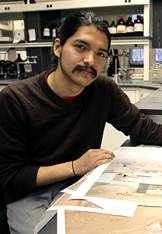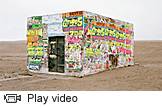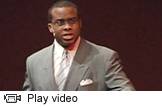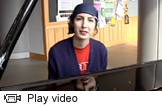Senior Carlos Jiménez Cahua can be found most evenings at the digital photography lab at 185 Nassau St., scanning his pictures into the computer, editing them in Photoshop and printing them out as 8-by-10 images. Jiménez Cahua's passion for photography has taken him to Lima, Perú, on a Princeton fellowship to photograph landscapes and cityscapes, and to Florence, Italy, where he spent a semester studying at the Studio Art Centers International. He has done all of this while majoring in chemistry.
Jiménez Cahua offers just one example of the different ways that Princeton students weave the arts into their lives. In the classroom, students can major in music or pursue certificates in theater and dance, visual arts or creative writing. Many others are involved in numerous extracurricular arts activities across campus -- finding they can focus their studies in different fields and still have ample time to flourish in their artistic endeavors.
Music classes and rehearsals dominate the daily schedule of senior Julia Brav, a jazz pianist who has been lauded for her inventiveness and sophistication as a musician. Last month Brav performed in Toronto at one of the world's largest jazz gatherings, the annual conference of the International Association for Jazz Education, after winning a place in the association's Sisters in Jazz Collegiate All-Star Quintet. But attending Princeton means she also focuses on subjects outside of music. When a fellow musician told her about his travels in Japan during his junior year abroad, Brav was so intrigued that she decided to sign up for a course about Japanese society and culture, which turned out to be one of her favorite classes at Princeton.
"Julia is a brilliant musician who is already in possession of a unique voice and musical spirit as both a pianist and composer," said Anthony D.J. Branker, a 1980 Princeton graduate who directs the University's jazz program and is a senior lecturer in music. "But she also has a wide variety of academic and artistic interests, and pursuing an education at Princeton has allowed her to take advantage of the open-endedness that a strong liberal arts education has to offer."
Junior Kelvin Dinkins spends as much time working on marketing plans and tour schedules as rehearsing solos as the president of the Triangle Club, the University's oldest theater group. Dinkins had no musical theater experience before arriving at Princeton, but when he saw his first Triangle show during his freshman year, he knew he wanted to be part of it. He's planning to compose the book for a musical play as his senior thesis in the English department.
In her January 2006 report announcing the University's expansion of its creative and performing arts programs, which led to the creation of the Lewis Center for the Arts, President Shirley M. Tilghman noted that many students interested in attending Princeton have deep commitments to the arts.
"For the most part these students do not aspire to become professional artists, but they seek a university where they can integrate their academic pursuits with their artistic passions. They become not only music majors and art historians but physicists and philosophers; not only English and comparative literature majors but economists and engineers," Tilghman wrote. "Their talent and imagination are visible in every corner of the University, adding a distinctive dimension to intellectual inquiry and enriching campus life with a breathtaking array of exhibits, performances and creative endeavors."
The following profiles show how Jiménez Cahua, Brav and Dinkins have incorporated the arts into their Princeton experiences.
Scientific rigor and artistic expression
One of Jiménez Cahua's favorite days at 185 Nassau St. is when they hold "open studios." Every student artist pins recent work up on the walls of the fourth-floor studio, and faculty members from every discipline come by and offer comments.
"I get to hear what drawing and film professors think about my photographs," said Jiménez Cahua, whose work explores man's relationship with his landscape. "They always have a different twist on how they interpret my work, and sometimes they see things I hadn't even intended to put in."
Jiménez Cahua hadn't intended to pursue art when he came to Princeton, but a class in black-and-white photography taught by lecturer Accra Shepp that he signed up for "on a whim" during his sophomore year struck a chord with him.
"I pretty much haven't stopped making photos since," said Jiménez Cahua, who is earning a certificate in the Program in Visual Arts.
At the same time, Jiménez Cahua, who was born in Lima and raised in New Jersey and South Carolina, has kept up with the requirements for a chemistry major. In order to be able to go to Florence to study photography during his junior year, Jiménez Cahua had to complete his junior independent work for chemistry during his sophomore year. For his senior thesis in photography -- required for those earning a certificate -- Jiménez Cahua traveled to Lima on a Lucas Summer Fellowship, awarded annually by the University to two juniors for thesis work, to photograph the urban landscape.
His photographs of construction sites have a "formal beauty and minimalism," said Jocelyn Lee, a lecturer in visual arts and in the Lewis Center. "What's interesting about his photographs is that they document normally unrecognized spaces -- essentially overlooked spaces -- and they also make reference to minimalist painting and sculpture."
Princeton has made it relatively easy to pursue both his interests, Jiménez Cahua said.
"You don't have to declare your major until your sophomore year, so there is more freedom in taking courses," he said. "Because of that freedom, I was able to sample courses in the arts."
And studying two disparate fields affords Jiménez Cahua the chance to explore two different ways of thinking, he said.
"Science is so rigorous. There is a right answer always," he said. "But in art there are no right or wrong answers."
His research in organic chemistry, in which he is attempting to synthesize a new organic superconductor that could one day be used on a circuit board, offers him an opportunity to explore new ground with laboratory research and to work as part of a team. Photography enables him to work independently and follow his eye.
"Doing both is a boon," he said.
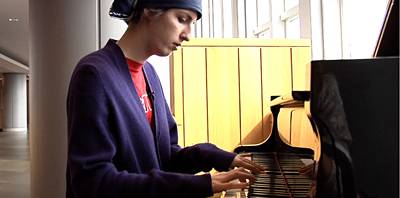
Different perspectives on music and education
Last year, Brav was recognized by leading jazz publication Down Beat magazine with a citation for outstanding performance in the best college jazz soloist category. She shared the award with several students who attend noted music conservatories such as the Juilliard Institute for Jazz Studies and the Manhattan School of Music. Brav is glad that she didn't choose that route.
"I placed a premium on getting a well-rounded education as well as a good musical education," said Brav, who is majoring in music and earning a certificate in musical performance. "I've taken so many interesting classes with professors here who are leaders in their fields, and I wouldn't have been able to do that if I'd gone to a conservatory."
And being at a liberal arts university means that Brav befriends fellow students who are not entrenched in the world of music.
"I've met a lot of people who appreciate music but don't necessarily play jazz, and that's really interesting," she said. "I get different perspectives on what I'm doing."
Brav started playing piano at the age of 6, when she got a keyboard as a birthday present from her grandfather. She began classical piano lessons soon after, and started playing jazz in her freshman year at Princeton High School. Branker heard Brav play and invited her to audition for one of the University's jazz ensembles, which she joined in her junior year of high school.
As a student in Princeton's jazz program, Brav has traveled to Estonia to perform in a series of concerts sponsored by the U.S. Department of State, served as a featured soloist in several University jazz groups and performed her composition "Il Mago" on a CD released by Princeton's Jazz Composers Collective. She also composed a suite for her junior independent work consisting of three works, each inspired by a female composer who has made important contributions to modern jazz.
"As a composer, Julia creates works that display remarkable lyrical melodic flow, infectious rhythmic relationships and a strong grasp of a variety of harmonic practices," Branker said. "When Julia brings a new composition to one of our ensembles, I know that it will pose intriguing conceptual challenges for our musicians and take the listener on a wonderful musical journey."
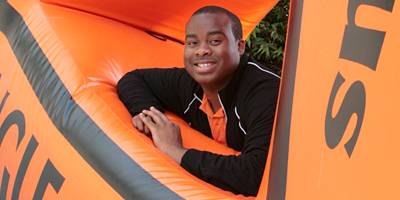
Inner workings of the theater world
Dinkins understands that most of the people who work in theater are not up on the stage under the spotlights -- they are in the wings and the lighting booth, making the show happen. While he loves acting and singing, Dinkins has taken courses in directing, producing and playwriting that have immersed him in the not-so-glamorous parts of the theater business.
"For our directing class, I had to find a cast, secure a location, design lights, coordinate schedules, get costumes and find tech people, all without a budget," said Dinkins, who is earning a certificate in the Program in Theater and Dance. "I'm learning how to orchestrate a production on my own, and what the pressures are in theater."
Dinkins loves the hands-on aspect of the theater classes he has taken. For a course on the works of Edward Albee, Dinkins and the rest of the class met with the legendary playwright and attended rehearsals with professional actors for a new Albee play that opened last month at the Berlind Theatre.
And the relatively small size of Princeton's theater program means there are more opportunities.
"You can propose to direct a show after your freshman year," he said, noting that younger students might not have the chance to helm their own productions at an arts school.
While gaining experience in many aspects of theater production, Dinkins also has taken several literature courses and currently is writing a junior paper on emasculation in Greek political dramas.
Dinkins, who was born in Queens, N.Y., and now resides in Atlanta, also is interested in business, and serving as president of the Triangle Club has provided him with plenty of business experience. He has overseen direct-mail campaigns, attended quarterly meetings with the club's trustee board and helped appoint a business manager. He also has studied economics and taken a course called "The Culture of Consumption," which analyzed branding and marketing.
"He has a broad range of interests in subjects theatrical and a lot of talents, and he's getting a chance to explore all of them," said Michael Cadden, the director of the Program in Theater and Dance. "One of the things a liberal arts education in this subject gets you is a chance to learn about the field as a whole, as opposed to concentrating on one narrow pathway."
While performing a solo in last fall's Triangle show was a highlight of his Princeton career, Dinkins has found that he also relishes handling the less spectacular elements of theater administration for the group.
"All of it is about fulfilling an artistic vision," he said.
